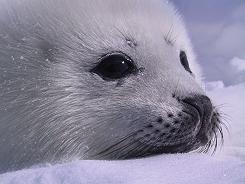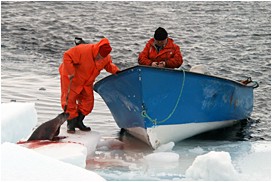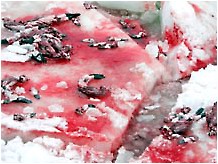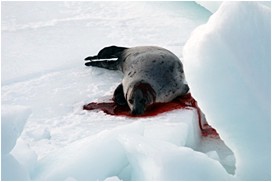
 Just when environmentalists and animal rights advocates were beginning to see a light at the end of the deep, dark and disgraceful tunnel known as the Canadian seal hunt, Canada's very own Sarah Palin, Fisheries Minister Gail Shea, announced last month that restrictions on exporting seal meat to China had been lifted. With the recent European Union ban on seal products in place, Shea and her cronies in Ottawa see China as a potential ally in what appears as yet another desperate attempt to save the economically defunct and morally bankrupt industry.
Just when environmentalists and animal rights advocates were beginning to see a light at the end of the deep, dark and disgraceful tunnel known as the Canadian seal hunt, Canada's very own Sarah Palin, Fisheries Minister Gail Shea, announced last month that restrictions on exporting seal meat to China had been lifted. With the recent European Union ban on seal products in place, Shea and her cronies in Ottawa see China as a potential ally in what appears as yet another desperate attempt to save the economically defunct and morally bankrupt industry.
It is common knowledge that the bloodbath that has claimed hundreds of thousands of innocent lives over recent decades is both inhumane and cruel and any party that can defend the bludgeoning and skinning alive of defenseless and sentient beings as justifiable in any way, shape or form should perhaps consider pursuing that conversation with a clinical psychiatrist. Yet while it is difficult to defend the pitiful acts by a small population of New Foundland and Labrador sealers, based on the simple logic known as free will and moral responsibility, the truth of the matter is that they too have had the wool pulled over their eyes by Parliament's legacy of deception and Shea's apparent ego-based mission to keep the seal hunt alive at all costs.

Perhaps a wake up call should have occurred in 2008 when four sealers where killed when their small boat, being towed by the Canadian Coastguard, capsized leaving behind families and a grieving community in the wake of the national disaster. Unfortunately, what presented a real opportunity for the Canadian government to restore any trace of integrity by finally owning up to its mismanagement of the Atlantic fisheries instead turned the tragedy into yet another diluted patriotic justification to rally behind a despicable and out dated industry. News flash: seals are not responsible for the over consumption of fish stocks. Human incompetence and overfishing are in fact the only culprits here and it is the seals who pay the ultimate price.
It is due time that the Canadian government agencies in charge of fisheries and oceans management seek viable and sustainable solutions for its nations impoverished populations instead of wasting millions of taxpayer dollars to further develop unwanted seal products in the global marketplace. The United States, Mexico and the EU have all passed legislation banning the trade of seal products, yet the Canadian government continues to pump large amounts of subsidies into selling products that people simply no longer want. Instead, Shea hopes that this new kinship with China will help offset the significant financial blow caused by the EU's ethical and rationale decision to ban seal products last spring. According to Shea, the fate of the seals hunt lies in the hands of the industry to, "ensure that we actually start selling some of these products into the marketplace." Perhaps Ms. Shea would be best serving her fellow country men by instead investigating a more innovative solution such as human evolution.
According to a recent post by Cheryl Jacobson of In Defense of Animals:
"Over the last 15 years, Canada has spent unspeakable sums of money trying to develop markets, including China, for edible seal products to no avail. Seal meat is an acquired taste that few people outside of sealing communities find it palatable. Demand for the meat is so low that sealers often abandon the carcasses on the ice to rot."

International headlines were also made back in 2009 when in a thoroughly inappropriate gesture turned national embarrassment, Governor General Michaelle Jean, decided to show her support of the sealing industry by slicing out the heart of dead baby seal and eating it raw at an Inuit gathering in Nunuvut. Many critics found her actions to be more symbolic of 21st century barbarism than acceptable dignitary behavior by the representative of Britain's Queen Elizabeth II and Canada's head of state. It was also very misleading. The maritime seal hunt that takes place every year is not a native hunt, although the Canadian government deliberately continues to confuse people to believe otherwise.
In reality, Canada's commercial seal hunt and the Inuit seal hunt are two unrelated operations that take place in seperate areas of the great north and involve two different species of seals. The commercial seal hunt is not a traditonal "substinence" or "full utilization hunt" and most of the meat is left on the ice with reports of 80% of the blubber being discarded. Seals can legally be killed as soon as they begin molting their white natal fur, which occurs at less than two weeks of age, and almost all the seals killed in the commercial hunt are just three months old or younger. Thus, the primary target of Canada's commercial seal hunt is for the fur of young harp pups which is sent overseas to be proceesed for its shameful use in the fashion industry. The commercial hunt has absolutely nothing to do with the preservation of aboriginal cultures and traditions and the Canadian government's outright deception of this fact is deplorable. It is also degrading to all Canadians, particularly the Inuit, who the government continue to scapegoat based on their own political and economic agenda.
According to director of Humane Society International Canada, Rebecca Aldworth, "Inuit people are protected in the legislation. To suggest otherwise is deceptive on the part of the Canadian government." The new EU law offers certain exemptions to Inuit communities from Canada, Greenland and elsewhere that allows for limited traditional hunts, but bars them from large-scale trading of their pelts and other seal goods in Europe.
The commercial seal hunt provides off-season monetary incentive for a handful of big-business fishing companies based on greed and calculated misinformation. Furthermore, only about 6,000 people derive some form of income from commercial seal hunting which generates roughly $10-million in annual exports -- not exactly a real cash cow. With the price of seal pelts dropping each year, it is evident that further investment in this collapsing industry is a waste of both tax paying dollars and innocent, defenseless lives.
Furthermore, while China certainly does not have a stellar rapport amongst animal rights activist for a plethora of valid reasons far too lengthy to mention here, The Canadian government's general assumption that Chinese consumers will condone the cruel slaughter of seal pups is yet another highly ethnocentric insult which some opponents believe the Chinese will not take lightly.
In a blatant display of cultural ignorance, a seal industry executive was quoted last year in the Toronto Globe and Mail, as stating, "The Chinese eat anything. And they simply don't understand why you would put one animal over another." Wow. It sounds like someone may need a refresher course in Anthropology 101.
According to IFAW's Asia Regional Director Grace Gabriel,
"This is slap on the face for China, Chinese culture and Chinese people. China is not a dumping ground for Canadian seal products and Chinese consumers should not shoulder the ethical responsibility of paying for the cruel slaughter of seals in Canada."

Just whether or not the Chinese public will take the bait and serve as the fall guy for this dying industry plagued by shame and deceit is yet to be seen. With the annual commercial seal hunt set to begin next month, is it not our duty as compassionate and concerned global citizens to let Canada know that enough is enough already: STOP THE SLAUGHTER!
For more information on the Canadian seal hunt and to learn how you may take action today to stop this horrific and senseless slaughter please visit the following websites:
To contact Fisheries and Oceans Canada directly to voice your opinions and concerns:
House of Commons, Ottawa, Ontario, K1A 0A6 Telephone: 613.992.9223, Fax: 613.992.1974
ALL PHOTOS COURTESY: THE SEA SHEPHERD CONSERVATION SOCIETY